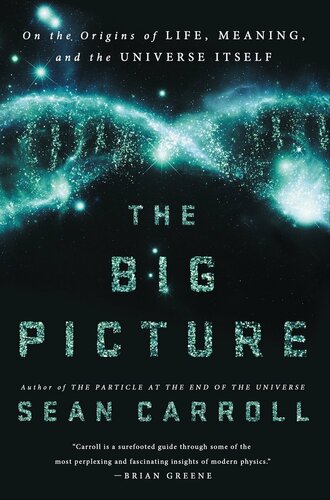
The Big Picture
On the Origins of Life, Meaning, and the Universe Itself
کتاب های مرتبط
- اطلاعات
- نقد و بررسی
- دیدگاه کاربران
نقد و بررسی

March 7, 2016
Carroll (The Particle at the End of the Universe), a theoretical physicist at Caltech, marshals an impressive array of scientific information to convince readers that the universe and everything in it can be explained by science. He posits “poetic naturalism” as a philosophy, which for him serves as a way to figure out “the best way to talk about the world.” He distinguishes his poetic form from other variants of naturalism by affirming that there is an underlying physical reality that exists independently of the human mind, and that there are “many useful ways of talking about it.” His determination to counter supernatural ontologies drives the book, and Carroll acknowledges that his philosophy may seem like “an appealing idea” to some and “an absurd bunch of hooey” to others. Carroll can be repetitive, and some of his the anecdotes, such as the connection between Elisabeth of Bohemia and René Descartes, are interesting but tangential. Much of the material here will be new to many readers, but regardless of familiarity, Carroll presents a means through which people can better understand themselves, their universe, and their conceptions of a meaningful life: “It’s up to us to make wise choices and shape the world to be a better place.” Agent: Katinka Matson, Brockman Inc.

March 15, 2016
"From the perspective of a vast, seemingly indifferent cosmos," do our lives really matter? As might be expected, Carroll's (Theoretical Physics/Caltech; The Particle at the End of the Universe: How the Hunt for the Higgs Boson Leads Us to the Edge of a New World, 2012, etc.) answer is affirmative but not simple. "We are not the reason for the existence of the universe," he writes, "but our ability for self-awareness and reflection make us special within it." Furthermore, "understanding how the world works, and what constraints that puts on who we are, is an important part of understanding how we fit into the big picture." In this fascinating book, Carroll explores "how and why, in the context of mindless evolution from the Big Bang to the present, the laws of physics brought about complex, adaptive, intelligent, responsive, evolving, caring creatures like you and me." To effectively navigate these complicated matters, he turns to an area of his own research regarding how the emergence of increasing complexity in the evolving universe relates to increasing entropy, the second law of thermodynamics. Although intuitively, we associate entropy with disorganization and increased randomness, it plays a crucial role in the development of complex structures. For example, it is randomness and apparent disorganization--the role of chance variation and mutations--that are central to Charles Darwin's theory of natural selection. At each successive level of complexity--from stars and planets to life and conscious beings--different levels of descriptive language are necessary. This introduces a poetic aspect into the language used by scientists in their attempts to understand our place in the universe. The author affirms his conviction that "nothing we...know about consciousness should lead us to doubt the ordinary, naturalistic conception of the world," including the provisional nature of scientific theory. Carroll is the perfect guide on this wondrous journey of discovery. A brilliantly lucid exposition of profound philosophical and scientific issues in a language accessible to lay readers.
COPYRIGHT(2016) Kirkus Reviews, ALL RIGHTS RESERVED.

May 15, 2016
Theoretical physicist Carroll (The Particle at the End of the Universe, 2012) thinks we need to do better at reconciling how we talk about life's meaning with what we know about the scientific image of our universe. This book is his attempt to do so, and it's a successful one that's true to the grand scope of its title. Divided into five sections of increasingly narrow focus, the book starts way out to explore the philosophy of science and ways of talking about our understanding of reality, which Carroll calls poetic naturalism. From there, he investigates Bayes' theorem of statistics, entropy, vacuum energy, and much more before landing back on Earth to ponder morality, ethics, and the improbability of theism. Though often highly technical, Carroll aims his writing at a general audience, barraging readers with analogies and thought experiments galore and sprinkling in weightier topics via familiar references, such as how human consciousness is explained by the movie Inside Out. Readers unaccustomed to science jargon might struggle with dissections of quantum mechanics, up quarks, and gluons, but anyone who enjoys asking big questions will find a lot to consider.(Reprinted with permission of Booklist, copyright 2016, American Library Association.)

December 1, 2015
A theoretical physicist at the California Institute of Technology, Carroll won the Royal Society Winton Prize for The Particle at the End of the Universe, his explication of the world-blowing discovery of the Higgs boson in 2012. As if that weren't a big enough deal, here he guides us through several centuries' worth of scientific discoveries to show how they have forged our understanding and indeed how the laws of nature are linked to the most fundamental human questions of life, death, and our place in the cosmos.
Copyright 2015 Library Journal, LLC Used with permission.

























دیدگاه کاربران